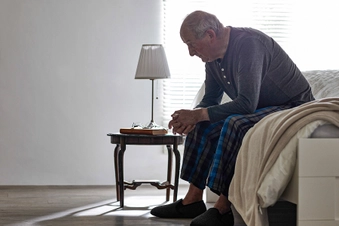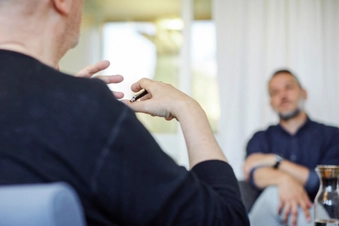Care for Your Mental Health with Follicular Lymphoma

Follicular Lymphoma and Mental Health
Living with and treating follicular lymphoma can be emotionally intense. Along with the physical symptoms such as fatigue that can impact your quality of life, it’s common to feel shock, fear, sadness, and worry. These feelings are normal, but you can also take steps to manage them.

Symptoms of Anxiety
Anxiety is a natural response to a cancer diagnosis, but over time, it can start to impact your daily life. If you’re increasingly irritable, having trouble sleeping, feeling muscle tightness or shortness of breath, or have a racing heart, these are signs from your body that you may need some extra mental health support.

Symptoms of Depression
If you find yourself withdrawing from your typical activities, are more tired than usual, struggle with your memory and concentration, and have an overall “flat” or numb feeling for most of the day for weeks or more, you may be dealing with depression. Addressing these symptoms is an important part of cancer care.

Talk to Your Team
Whether you’re already concerned about your mental health or being proactive, talking to your doctor is a good place to start. They can point you in the direction of mental health services, some of which may be cancer-focused and part of your clinic or health care system.

Consider Counseling
It’s important not to ignore difficult emotions. This can make them harder to deal with over time. A trained professional or counselor can guide you through talk therapy to explore how you’re feeling and why. This kind of work gives you tools to better manage mental distress.

Connect With Others
Being open and honest with people you trust about your struggles can relieve some of your emotional burden. A support group is another good way to form bonds, get advice, and feel less alone as you go through your follicular lymphoma journey.

Practice Meditation
Studies show mindfulness and meditation reduce anxiety for people dealing with cancer-related depression and anxiety. There are many apps that lead you through guided meditations, or you can practice sitting still and focusing on your breath or a repeated word or sound. Start with 5 minutes and build up over time.

Control Your Information Intake
Learning about your lymphoma can make you feel empowered and more in control. But be mindful of where you get your information. Limit blogs and social media content and stick to reputable sources such as your own medical team, the American Cancer Society, the Leukemia and Lymphoma Society, and other science-backed sites.

Care for Your Whole Self
There will be many times when fatigue and emotional stress will make it harder to focus on your overall wellness. But exercising, eating nutritious foods, and getting good sleep all go a long way toward boosting your mood and keeping you mentally healthy.

Relax Your Body
Relaxation exercises such as deep breathing practices, intentional muscle tensing and relaxing, and guided imagery can lower anxiety levels.

Keep a Gratitude Journal
For many people the idea of “staying positive” can feel unrealistic and frustrating. But small acts of positive thinking can make a positive impact on your mental wellness. One way to practice positivity is by keeping a record every day of the things you’re thankful for. This helps gently guide your mind toward mental resilience.

Do the Things You Love
Though a cancer diagnosis can take up much of your thoughts and energy, save room for hobbies and activities that bring you joy. Carve out time in your day for projects and pursuits that foster a sense of creativity, contentment, and happiness.
Show Sources
IMAGES PROVIDED BY:
1. DigitalVision/Getty Image
2. Moment RF/Getty Images
3. E+/Getty Images
4. PhotoAlto Agency RF Collections/Getty Images
5. Maskot/Getty Images
6. iStock/Getty Images
7. E+/Getty Images
8. Moment RF/Getty Images
9. iStock/Getty Images
10. E+/Getty Images
11. Johner Images RF/Getty Images
12. E+/Getty Images
SOURCES:
National Institute for Health and Clinical Excellence: “What is like to have follicular lymphoma.”
Lymphoma Action: “The emotional impact of living with lymphoma.”
Cancer.Net: “Depression.”
Follicular Lymphoma Foundation: “Supporting Mental Health: Addressing Psychological Challenges During Cancer Treatment.”
University of Rochester Medical Center: “Science Backs Mind-Body Tools Like Meditation and Music for Cancer-Related Anxiety.”
Cleveland Clinic: “Follicular Lymphoma.”
National Cancer Institute: “How to Relax Your Mind and Body.”